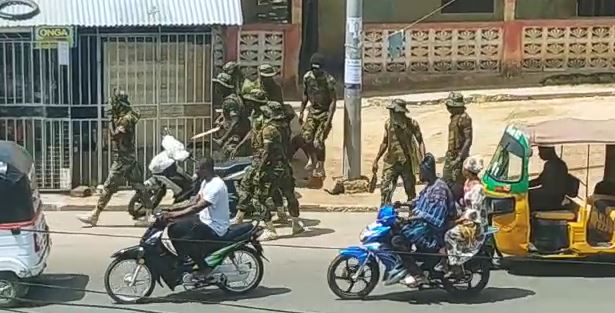Legal expert Martin Kpebu has attributed the growing impunity of military personnel in the country to high rates of illiteracy and a culture of mob justice in Ghana.
According to him, despite there not being any rule in Ghana permitting the military to mete out brutality on civilians, the culture of instant justice in the country was fueling military impunity, thus increasing military brutality cases on citizens.
“It’s just the impunity, the impunity that has been going on over these decades that is what is manifesting in what they did.
“There’s that impunity because there is this sub-culture that even Ghanaians, some of our own people, anything that happens, the least thing they say ‘we want you to bring in the soldiers. Bring in the soldiers to discipline them,’” he said on JoyNews’ AM Show.
“Would you believe that people still think that way today? People have no regard for the rule of law. They will tell you that ‘o bring in the military, as for soldier, soldier will come and brutalise them,’” he added.
He stated that a lack of appreciation for due process in the court of law has also contributed to this culture of instant justice, which fuels military brutality.
He stated that the low legal literacy rate in the country has led to most Ghanaians seeing brutality from state security apparatus as a legitimate means of addressing issues in the country.
He said, “You know, because often the court system takes some time, people don’t understand how the court system works and are often very interested in instant justice. But, you know, for instance, justice is also very rife in our culture; we kind of like it, that’s what eats into allowing the military to do what they do. Some people like it.
“This video you’ve seen, I’ve heard some people saying, ‘yeah, that’s how it is because when you go to court, it takes forever. However, people fail to appreciate that the rule of law requires that there should be due process so you cannot just go to court and within a week you’ve finished. No. there are processes.”
Thus, he called for education to quell the thirst for instant justice and its consequent military brutality.
“Thus, it comes back to the point that you have to do more education. As long as we have this high rate of illiteracy in Ghana, these soldiers would have room to operate because some people like what they do.
“They say ‘yes that’s justice, as for soldiers when you bring them, they’ll brutalise you, and everything will become quiet.’ So from what I see in this picture, I pray that the authorities will identify the soldiers and have them prosecuted,” he concluded.
Latest Stories
-
DAMC, Free Food Company, to distribute 10,000 packs of food to street kids
43 minutes -
Kwame Boafo Akuffo: Court ruling on re-collation flawed
1 hour -
Samuel Yaw Adusei: The strategist behind NDC’s electoral security in Ashanti region
1 hour -
I’m confident posterity will judge my performance well – Akufo-Addo
1 hour -
Syria’s minorities seek security as country charts new future
2 hours -
Prof. Nana Aba Appiah Amfo re-appointed as Vice-Chancellor of the University of Ghana
2 hours -
German police probe market attack security and warnings
2 hours -
Grief and anger in Magdeburg after Christmas market attack
2 hours -
Baltasar Coin becomes first Ghanaian meme coin to hit DEX Screener at $100K market cap
3 hours -
EC blames re-collation of disputed results on widespread lawlessness by party supporters
3 hours -
Top 20 Ghanaian songs released in 2024
4 hours -
Beating Messi’s Inter Miami to MLS Cup feels amazing – Joseph Paintsil
4 hours -
NDC administration will reverse all ‘last-minute’ gov’t employee promotions – Asiedu Nketiah
4 hours -
Kudus sights ‘authority and kingship’ for elephant stool celebration
4 hours -
We’ll embrace cutting-edge technologies to address emerging healthcare needs – Prof. Antwi-Kusi
5 hours

